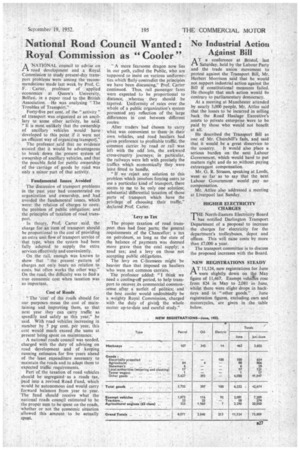National Road Council Wanted: Royal Commission as " Cooler "
Page 61

If you've noticed an error in this article please click here to report it so we can fix it.
A. 'NATIONAL. council to advise on road development and a Royal Commission to study present-day transport problems were among the recommendations made last week by Prof. C.
F. Carter, professor of . applied economics at Queen's University, Belfast, in a paper read to the British Association. He was analysing "The Troubles of Transport."
Forty-five per cent, of the " activity " of transport was organized as an ancillary to some other activity, he said. "It is most unlikely that the ownership of ancillary vehicles would have developed to this point if it were not an efficient way of organizing transport."
The professor said that no evidence existed that it would be advantageous to break down the 'present system of ownership of ancillary vehicles, and that the possible field for public ownership of the carriage of goods by road was only a minor part of that activity.
Fundamental Issues Avoided The discussion of transport problems in the past year had concentrated on organization and ownership, and had avoided the fundamental issues, which were: the relation of charges to costs; the problem of public obligation; and the principles of taxation of road transport.
In theory, Prof. Carter said, the charge for an item of transport should be proportional to the cost of providing an extra unit flow of transport service of that type, when the system had been fully adapted to supply the extra services effectively and conveniently.
On the rail, enough was known to show that "the present -pattern of charges not only bears no relation to costs, but often works the other way." On the road, the difficulty was to find a true economic cost when taxation was so important.
Cost of Roads "The 'cost' of the roads should for our purposes -mean the cost of maintaining and improving them, so that next year they can carry traffic as speedily and safely as this year," he said. With road Vehicles increasing in number by 5 pej cent, per year, this cost would much exceed the sums at present being spent on maintenance.
A national roads council was needed, charged with the duty of advising on road development and of keeping running estimates. for five years ahead of the least expenditure necessary to maintain the roads and to adapt them to expected traffic requirements.
Part of the taxation of road vehicles should be segregated as a roads tax, paid into a revived Road Fund, which would be autonomous and would carry forward balances from year to year. The fund should receive what the national roads council estimated to be the proper sum to be spent on the roads, whether or not the economic situation • allowed this amount to be actually spent.
"A more fearsome dragon now lies in our path, called the Public, who are supposed to insist on various uniformities which flatly contradict the principles we have been discussing," Prof. Carter continued. Thus; rail passenger fares were expected to be proportional to distance, .. whereas they should be tapered. Uniformity of rates over the whole of a public organization's system prevented any reflection_ of the. large. differences in cost between different routes.
After traders had chosen to carry what was convenient to them in their own vehicles, and road hauliers had given preference to profitable traffic, the common carrier by road or rail was left with the odd lots, the awkward cross-country journeys; in particular, the railways were left with precisely the traffics which economically they were least fitted to handle.
If we reject any solution to this problem which involves forcing users to use a particular kind of transport, there seems to me to be only one solution; substantial differential taxation of those parts of transport which have the privilege of choosing their traffic," declared Prof. Carter.
'Levy as Tax The proper taxation of road transport thus had four parts; the general requirements of the Chancellor; a tax on petroleum, as long as the state of the balance of payments was deemed more grave than the coal supply; a road tax; and a levy on those not accepting public obEgations.
The levy on C-licensees might he heavier than that imposed on hauliers who were not common carriers.
The professor added: "I think we need a cooling-off period, to help transport to recover its commercial cofnmon,sense after a surfeit of politics; and the best cooler would undoubtedly be a weighty Royal Commission, charged with the duty of givink the whole matter up-to-date and careful study.",




































































































































































